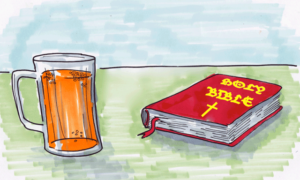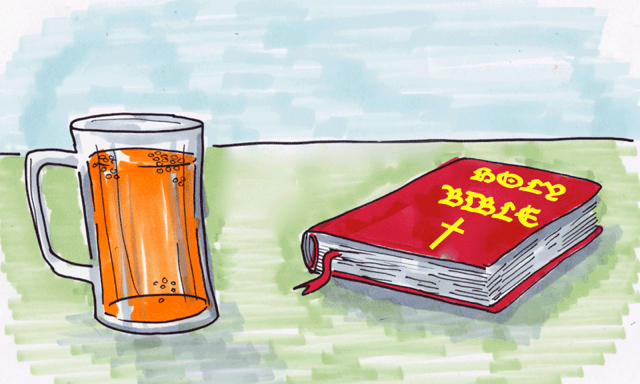15 February 2018
Reading In The Sun
The Old Testament.
By Chin Chin
 It is hot in the southern hemisphere so a certain amount of the time has to be spent reading in a deck chair, sipping a glass of cold beer. Actually, that is a little misleading as to priorities. The important bit is the sipping of the cold beer and it would be perfectly satisfactory to follow that up with a little sleep. If I had been born in a Mediterranean country no doubt that is what I would do, but Anglo Saxon Protestants are not built in that way. Leisure is enjoyable, so let’s not have too much of it. The work ethic needs to be satisfied and at its very lowest that means that drinking beer should be accompanied by reading something worthy. That is what is known as multitasking.
It is hot in the southern hemisphere so a certain amount of the time has to be spent reading in a deck chair, sipping a glass of cold beer. Actually, that is a little misleading as to priorities. The important bit is the sipping of the cold beer and it would be perfectly satisfactory to follow that up with a little sleep. If I had been born in a Mediterranean country no doubt that is what I would do, but Anglo Saxon Protestants are not built in that way. Leisure is enjoyable, so let’s not have too much of it. The work ethic needs to be satisfied and at its very lowest that means that drinking beer should be accompanied by reading something worthy. That is what is known as multitasking.
So, reading for the good of the soul it had to be, and what is better for the soul than to have a bash at the Old Testament. I don’t claim to know the New Testament all that well, but barring one or two of the more spectacular incidents, the Old is something of a closed book to me – or closed books to be more accurate. Anyway, a new bottle of iced beer was clearly called for as I began with the immortal words (King James’s version, of course) “In the beginning”.
That was a promising start. The words “Once upon a time” can be found at the beginning of all the best stories. Roman authors understood that. They used the word “Olim” which meant much the same thing. Those who wrote the book of Genesis will naturally have written in their own language and “in the beginning” is as near as the 17th-century translators could get to the sense of it. A good start then “In the beginning”.
It is hard to get very far into the Old Testament without feeling sorry for the opposition. There you were, a perfectly respectable Amalekite, sitting quietly in your part of the land of Canaan when the Children of Israel hove into view. They didn’t look friendly. Presumably you did the usual things like form a shield wall and put out sentries but whatever you did, and however bravely you fought, you didn’t stand a chance because the Lord had already decided that you weren’t going to win. It was a little bit like Arsenal playing Manchester United with a Lancashire referee. It seemed a little unfair to me.
Then there you come to the plagues which Moses visited on Pharaoh and these are not for the weak minded. The frogs and the turning of the water into blood are all right, but it is impossible to read about the plague of boils without looking nervously at your mosquito bites. Are they the normal size for this time of year or is there an angry look to them which indicates that they could be something else? Would it help if you ate unleavened bread for your breakfast? What certainly doesn’t help is to read the bit in Leviticus about people with sores presenting themselves to the priests who seem to have been the forerunners of the modern GP. It was leprosy or nothing in those days, and much depended on the colour of the spot. Hmm, I think I’ll take another look at those mosquito bites.
When you look at the complex rituals involved in Tabernacle building and the like, you realise how compelling the teachings of Christ must have been. The move from complexity to simplicity, from the priesthood to a personal faith must have been as attractive then as it was when Protestantism spread through Europe in the sixteenth century. An elite was pushed aside. An exclusive channel of communication became redundant. New elites and new channels gradually took their place. In a sense, you wonder if that is where we are now. New forms of communication have bypassed certain parts of the establishment leaving us to adjust to a new world where communication is far more direct. Will a new order replace the old? Probably. Will it do so in time to prevent disastrous dislocation? Probably not.
It is all fraught with uncertainty, of course, and a piece of that uncertainty sits on my desk. Many years ago I picked up a small piece of stone on the shore of the Sea of Galilee, not far from where the five thousand were fed. Most likely it was not there at the time or, if it was, was part of a rock deep underground, but sometimes when I look at it I wonder if, by any chance, it was touched by a sandal containing the foot of a man who, whether divine or not, changed the world for ever. As I turn it over in my hand I like to think that it was.


